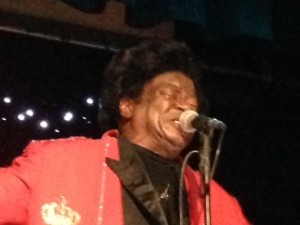 It’s 8 o’clock, two hours before the show. I am sitting on a wobbly chair in the damp, chilly basement of the Columbus Theatre in Providence, talking to Charles Bradley in the dressing room as he prepares for his show. He is friendly, open, emotional, warm and easy to talk to. He is curling his hair with an old gold and black curling iron. His hair is long and unruly and needs to be tamed for the show so that it will wave up and back in a James Brown pompadour. Curled, straightened, lifted, combed, and sprayed, it will stay in perfect place for the two hours that Charles Bradley will sing, dance, sweat, and project his heart and soul on stage to a sold-out Columbus. More than 800 adoring fans will be loving every deep, throaty, gut twisting note, every shimmy and shake of his hips, gesture of his hands, toss of the microphone. They dance, they scream, they press up against the stage. And when the last notes of his encore have soared away through the arching ceiling of the acoustically perfect Columbus, he descends from the stage to shake hands, to hug his audience, to share the love that he has been singing to them all night. As he climbs back up on to the stage and turns, like Santa Claus, to wave a good night to all, having given a great bundle of his most precious gifts, every hair is still in place, reflecting his inner strength and commitment to his music, his art and his audience that have kept Charles Bradley performing his music his way for more than 50 years.
It’s 8 o’clock, two hours before the show. I am sitting on a wobbly chair in the damp, chilly basement of the Columbus Theatre in Providence, talking to Charles Bradley in the dressing room as he prepares for his show. He is friendly, open, emotional, warm and easy to talk to. He is curling his hair with an old gold and black curling iron. His hair is long and unruly and needs to be tamed for the show so that it will wave up and back in a James Brown pompadour. Curled, straightened, lifted, combed, and sprayed, it will stay in perfect place for the two hours that Charles Bradley will sing, dance, sweat, and project his heart and soul on stage to a sold-out Columbus. More than 800 adoring fans will be loving every deep, throaty, gut twisting note, every shimmy and shake of his hips, gesture of his hands, toss of the microphone. They dance, they scream, they press up against the stage. And when the last notes of his encore have soared away through the arching ceiling of the acoustically perfect Columbus, he descends from the stage to shake hands, to hug his audience, to share the love that he has been singing to them all night. As he climbs back up on to the stage and turns, like Santa Claus, to wave a good night to all, having given a great bundle of his most precious gifts, every hair is still in place, reflecting his inner strength and commitment to his music, his art and his audience that have kept Charles Bradley performing his music his way for more than 50 years.
It’s cold in the dressing room, but Charles Bradley radiates energy. We talk about his mother, who recently passed away, and how he would bring her to his local shows in New York. On the night after her funeral, he had a show. His manager said he could cancel it. Everybody would understand. But he said no. He went out on stage and told his audience, “I buried my mother today.” He asked for two minutes of silence, of respect. He stood on stage, head bowed, weeping, and his audience at first were silent and then were openly sharing his emotion, his honesty. He told them that his mother was there with him, with them, but they already had sensed her, conjured by the intensity of her son’s feelings. Then he performed, all raw feelings, pain, broken-hearted suffering and the uplifting power of love. This is the power, the essence, the transforming work, the magic that Charles Bradley brings to the stage every night.
His songs are the musical and poetic manifestations of his life, the pain, the disappointment, the suffering, and the joy. He is 65. He has been performing since the ’60s, inspired by James Brown whom he saw at the Apollo in Harlem when he was 14. He embraced the funk and rhythm and blues style, sometimes working as a James Brown impersonator known as “Black Velvet” and later developing his own style. He didn’t release his own record until 2011 when he signed with the Daptone label. Since then he has cut two, aptly titled, No Time for Dreaming and Victim of Love. His style is retro, recalling the great African-American funk and R&B singers of the late ’50s and ’60s, but he touches young audiences with his powerful delivery and simple lyrics that transcend the impersonal and disconnected essence and nature of some currently popular musical forms and the DJs, mixers and samplers who perform them. Charles Bradley speaks to each and every person in his audience as a friend who has suffered life’s ups and downs, laughed, cried and is still standing, singing, and dancing, and, in the end, crying and hugging. He offers his emotional openness fearlessly and, like any great spiritual teacher, he takes his students on a journey, at the end of which they happily find themselves.



